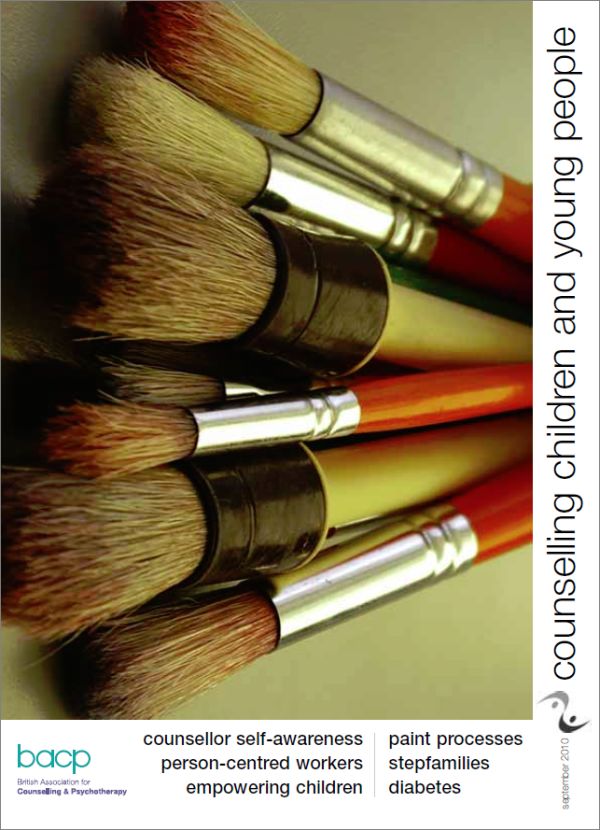In this issue
Changing families
Jon Blend describes the hurdles and dilemmas of stepfamilies
Working with diabetes Type 1
A good understanding of diabetes in general is useful for counsellors. Interview with Dr Rachel Besser
Paint processes
Eleanor Patrick considers paint in the counselling room; and four practitioners share case studies
SupervisionTalk 3
Julie Fallon on supervising other professionals who use counselling skills with young people
Counsellor self-awareness
Coach Julie Starr describes how to manage our states effectively
School-based counselling
Terry Hanley reports from the 2010 BACP Research Conference
Destination PhD
Val Taylor is tracking for us her research into supervision for school-based counsellors
Person-centred work with young people
Mark Prever explains his passion
Listening in Durham
A Tier 1 intervention by school staff. Keith Hibbert reports
Empowering children in therapy
Defending their rights, by Peter Jenkins
That Zigger feeling
Dorothy Eddi Piper is off to help Sri Lankan young people in her retirement
In my opinion
Margot Levinson speaks out on current concerns
From the chair

Not all articles from this issue are available online. Divisional members and subscribers can download the pdf from the BACP Children, Young People and Families archive.
Welcome from the editor
It was not until I had commissioned Jon Blend to write for us about ‘step situations’ that I realised I had experience of this myself in a small way – it’s become so commonplace that it can slip under the radar. Suzi Godson wrote in Radio Times recently (but we finalised our article first – honestly!): ‘The number of children who live out of suitcases, travelling between homes and parents, is accelerating at an unbelievable pace. Stepfamilies are now the fastest growing family type in Britain… Yet because social, as opposed to biological, parenting is such a recent phenomenon, there’s remarkably little support available for children struggling to cope with the changes in their lives.’1 A week later, Georgina Johnson, writing in The Telegraph, said: ‘There have been several times in the past when I would have liked the support of a well-informed counsellor.’2
So here you are – our guide for the want-to-be-well-informed counsellor! We do like to look around the edges and bring you articles on topics that are perhaps not addressed in counselling books. Stepfamilies is one, diabetes is another. It was good to interview Rachel Besser about the emotional struggles of children and young people diagnosed with diabetes Type 1. This was also shown graphically on The Hospital3 on Channel 4 recently. Even in the midst of a basically medical situation, there is obviously much that we, as therapists, might do to help.
Worryingly, the latest document from Lord Layard4 confirms that ‘in most areas, access to specialist psychological help for children is quite severely rationed. Only a quarter of children with mental health problems are currently receiving specialist help’. Margot Levinson has something to say about provision for children under an IAPT model, and I would be happy to hear your own views on this and other issues relevant to CCYP.
Provision of supervision for school counsellors, on the other hand, has become Val Taylor’s focus as she undertakes a research PhD. My hope is that, as we track her progress for a while, we will feel empowered to follow in her footsteps, however faint-hearted we have felt up to now about higher levels of study or researching our profession. As Terry Hanley shares with us his thoughts from this year’s presentations at the BACP Research Conference, I believe that Val’s findings will one day be up there with the rest. What about yours?
Eleanor Patrick
Editor
References
1 Radio Times. 17-23 July 2010.
2 The Telegraph. 24 July 2010. www.telegraph.co.uk/family/7904824/Creating-a-stepfamily-Homemaker-mother-or-old-boot.html
3 The Hospital. Channel 4, 16 August 2010.
4 Layard R. Campaign for psychological therapy: the case. 2010. http://cep.lse.ac.uk/textonly/_new/staff/layard/pdf/054_Campaign_Psychological_Therapy_18-02-10.pdf
